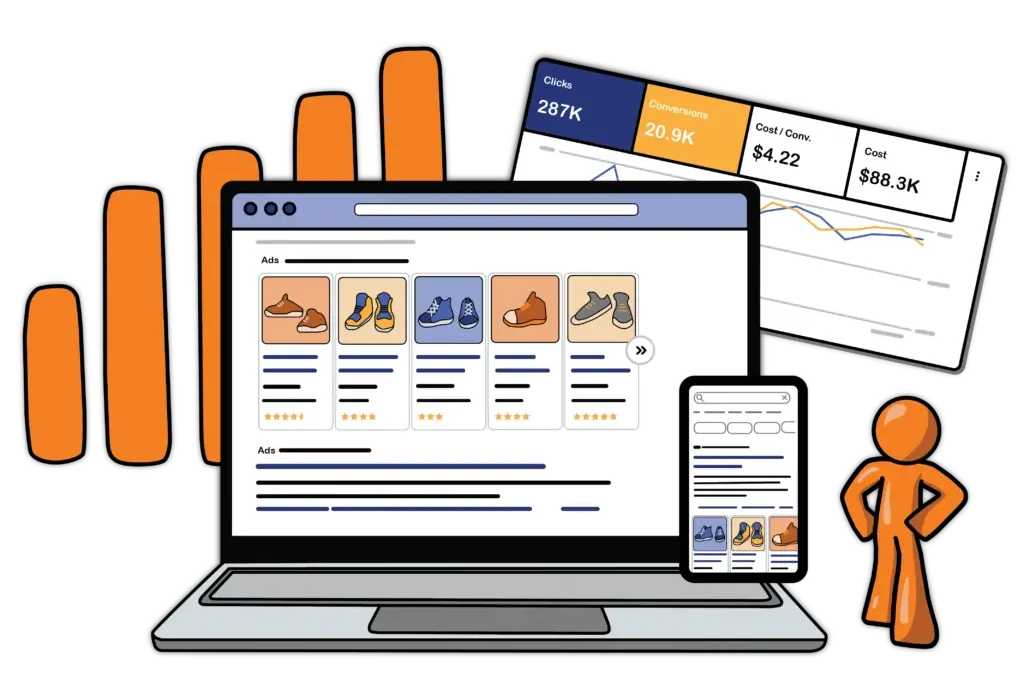Pay-per-click (PPC) advertising allows businesses to display ads on search engines and other platforms, paying only when someone clicks on their ad. Like any marketing investment, PPC campaigns need regular evaluation to ensure they’re delivering the best possible results for your budget.
A PPC audit is a comprehensive review of your paid advertising campaigns designed to identify opportunities for improvement and ensure your ad spend is working as efficiently as possible. Think of it as a health check for your digital advertising efforts.
Why Your Business Needs a PPC Audit
There are several situations when conducting a PPC audit becomes essential for maintaining effective advertising performance:
Taking Over Existing Campaigns
When inheriting PPC campaigns from a previous manager or agency, an audit ensures you understand what you’ve inherited and aren’t wasting budget on poorly performing elements. This prevents you from continuing ineffective strategies simply because “that’s how it’s always been done.”
Significant Competitive Changes
When competitors shift their advertising strategies, launch new campaigns, or enter your market space, an audit helps prevent your ads from becoming irrelevant or overpriced. The digital advertising landscape changes quickly, and what worked six months ago may no longer be effective.
Substantial Performance Changes
When you notice declining click-through rates, increasing costs per conversion, or other performance issues, an audit helps identify root causes before small problems become expensive ones. Early intervention can save significant advertising budget.
Regular Maintenance Schedule
Proactive businesses conduct audits every 6-12 months to ensure continued alignment with business goals and take advantage of new advertising features and tools. Regular audits prevent performance drift and identify optimization opportunities.
What’s Involved in a PPC Audit
Campaign managers with experience may have different approaches to conducting a PPC audit, but effective audits follow a systematic process that can be documented and replicated. Here’s what typically happens during a comprehensive audit:
Goal Alignment Assessment
The audit begins by confirming that your PPC campaigns still support your current business objectives. Marketing goals evolve, and campaigns that were perfectly aligned six months ago may no longer serve your needs. This step ensures all subsequent optimization efforts work toward the right outcomes.
Campaign Health Review
Next, the auditor examines how well your campaigns follow current best practices. This includes reviewing:
- Account organization: Are campaigns and ad groups logically structured?
- Creative alignment: Do your ad copy, images, and videos match what people are searching for?
- Active management: Is someone regularly optimizing performance and making necessary adjustments?
- Tracking setup: Are you measuring the actions that matter most to your business?
This step reveals the current state of your advertising efforts and identifies immediate improvement opportunities.
Change Recommendations
Based on the findings, the auditor determines what modifications are needed. These can range from minor tweaks to complete account restructuring, depending on what the review uncovers.
If your PPC goals are significantly misaligned with your business objectives, you may need to restart the planning process entirely. This involves researching relevant search terms, analyzing competition, and creating new campaigns with updated optimization targets.
More commonly, audits result in tactical improvements like updating ad copy, refreshing images, adjusting targeting parameters, or modifying conversion tracking. When PPC programs receive regular attention, realigning them typically involves refinements rather than overhauls.
Common Issues Discovered in PPC Audits
While some advertising accounts require complete rebuilding, most audits uncover these typical problems:
Outdated Creative Content
- Ad copy that no longer reflects your brand voice or current messaging
- Images that look dated or don’t showcase your latest products/services
- Landing pages that don’t match ad promises
Stale Targeting Lists
- Lists of irrelevant search terms haven’t been updated to block unwanted traffic
- Audience targeting hasn’t evolved with your customer base
- Geographic targeting doesn’t reflect current service areas
Missed Feature Opportunities
- Not utilizing the latest advertising tools and features effectively
- Missing out on new ad formats that could improve performance
- Failing to take advantage of automated bidding improvements
The rapid pace of change in digital advertising platforms means this last category often has the biggest impact on performance. Unlike obvious problems that show up in declining metrics, missed opportunities for improvement aren’t always visible until someone specifically looks for them.
Expected Outcomes and Timeline
Audit Duration
A thorough PPC audit typically takes 2-3 weeks to complete, depending on account complexity and the number of campaigns being reviewed.
Implementation Timeline
Implementing audit recommendations usually occurs in phases over 4-6 weeks, allowing time to monitor results and make adjustments.
What to Look for in a PPC Audit Provider
When selecting someone to conduct your PPC audit, consider these qualifications:
- Documented process: They should follow a systematic approach and provide clear documentation of findings
- Platform expertise: Experience with the specific advertising platforms you use (Google Ads, Microsoft Ads, Facebook, etc.)
- Industry knowledge: Understanding of your business type and typical customer journey
- Actionable recommendations: Ability to provide specific, prioritized suggestions rather than just identifying problems
- Performance tracking: Methods for measuring improvement after implementing changes
A quality PPC audit serves as both a diagnostic tool and a roadmap for improving your advertising performance. By understanding what’s involved and what outcomes to expect, you can make informed decisions about optimizing your paid advertising investments.
